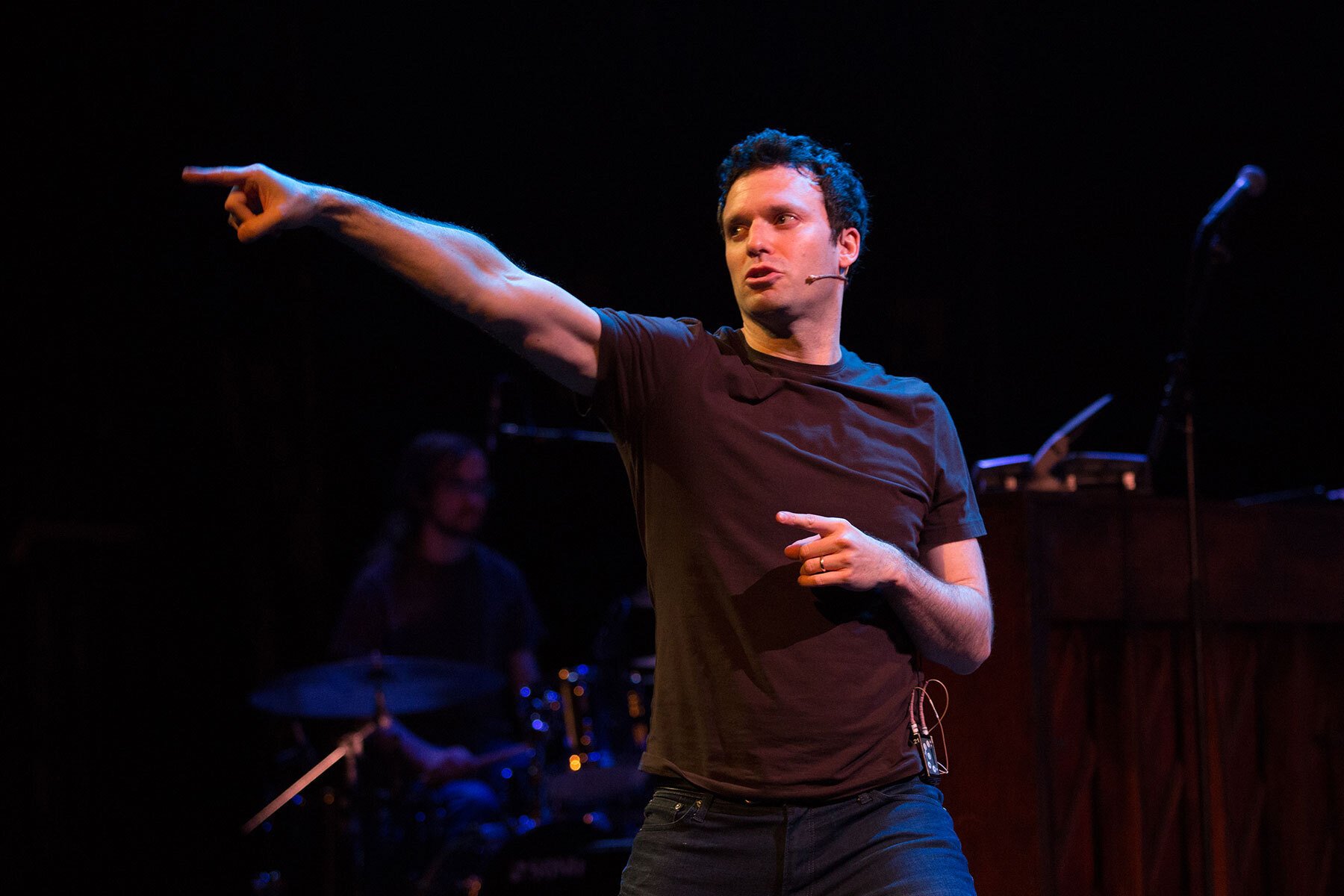Boy Falls from the Sky at Mirvish
Jake Epstein’s program note worried me. In it, he explains how Boy Falls From The Sky came to fruition, and singles out a storytelling night at the Streetcar Crowsnest as the moment he realized the power of simple, one-man storytelling. This struck me as odd — had Epstein really never seen a decent one-person cabaret? But, as I watched Boy Falls, I saw what Epstein was getting at: there’s an authenticity here — an unpretentiousness, even — that is quite rare for something we would categorize as “theatre”.
For instance, it would have been very easy for Epstein to get entrance applause for this show — the audience seemed like it would be more than happy to give it to him. But, together with director Robert McQueen, Epstein has crafted a very Canadian entrance that seems to go out of its way to circumvent entrance applause: Epstein enters diagonally, and walks right over to the band, who is already on stage. There, he tunes up his guitar, and leaps immediately into his first song. On the Tuesday night I saw it, the humbleness of Epstein’s entrance meant the audience wasn’t quite sure if the person who just walked on stage was Epstein at all — we’d seen his face on the program, but straight-on: his diagonal entrance offers only an indirect view of his profile, and, as he tunes up, his back is to the audience. Even if the audience wanted to applaud, we simply couldn’t do it with confidence.
This down-to-earthness runs through the whole production. There is a set — this isn’t the Fringe — but it only takes up a small portion of the stage. And, because there are no curtains up, we can see the usually hidden metallic innards of the Royal Alex backstage: as Epstein shares rarely heard backstage tales, we get a look at the rarely seen backstage of the physical space he is performing in, as well. Similarly, rather than the polished cup-of-water-on-a-table that you see in many stand-up specials and one-person shows, Epstein’s setup is messier: it looks like the inside of an apartment (or a dressing room), and his beverage station is cluttered with a coffee machine, a water bottle, a pitcher, and mugs.
Likewise, the piece is organized simply — Epstein chronologically walks us through his relationship to theatre, and, specifically, his journey coping with the dissatisfactions of “living the dream”. Productively, Epstein’s self-deconstruction made me consider how I mentally categorize theatre professionals: I had never seen Epstein’s work, but had read his bio, and thought of him as “the guy who was in Beautiful, Spiderman, and the Spring Awakening tour”. But as Epstein explains how he got these jobs, and how the experience of performing a role eight times a week affected his personal life, I realized just how limiting thinking of artists in terms of their resumes can be — it’s a dangerously commodifying way of categorizing people, but, then again, what’s the alternative?
Epstein’s vocal performances, too, are unassuming — though he clearly has professional-level vocal chops, he doesn’t swing them around needlessly: he only ever sings a note when it serves the story, and, when it makes more narrative sense for his singing to be worse (at a bad audition, for instance), Epstein doesn’t shy away from self-mockery.
Yet, even as the show’s format is particularly personal, Epstein imbues his stories with a gloriously old-timey kind of showbiz “razzle dazzle” — the sort of thing you’d expect to see in a Liza Minelli or Martin Short solo show, without all the performative bells and whistles. And this clashing of tones — the personal formatting of the performative content — makes the whole thing feel scarily close-to-home for a theatre-loving audience member like myself. As Epstein references Maltby and Shire’s Big and does spot-on impressions of Ethel Merman and Colm Wilkinson (including Colm’s characteristically high-pitched “24601” cutoff), I feel like I’m hanging out with a close friend.
It’s a weirdly personal experience, but almost everyone I’ve spoken to about the show feels the same — even in the cavernous Royal Alex, Epstein manages to connect with everyone in the audience individually, and tell a tight, polished story that doesn’t draw attention to its polish — a difficult feat, especially for a solo show, as they can easily feel artificially streamlined (the performer isn’t confident enough in their ability to entertain) or aggravatingly loose (the performer is too confident in their ability to entertain).
The show was originally programmed for the CAA, a much smaller venue, but if Epstein was caught off guard by Boy Falls’s venue upgrade, he doesn’t show it — I look forward to seeing how this show develops through the years, and whatever else Epstein has up his sleeve.

